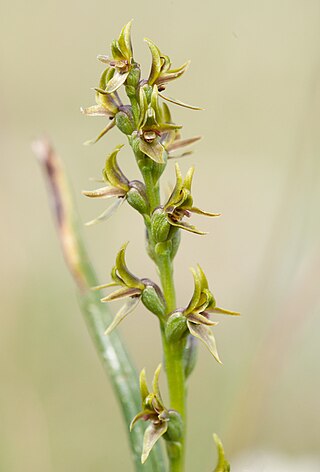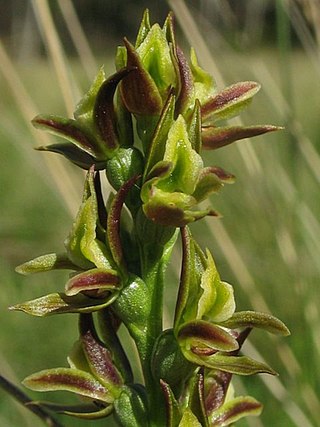
Prasophyllum tadgellianum, commonly known as the alpine leek orchid, is a species of orchid native to the Snowy Mountains and Tasmania. It has a single stiff, erect leaf and up to twenty scented, greenish-brown or reddish-brown flowers crowded on a stout spike.
Prasophyllum anticum, commonly known as the Pretty Hill leek orchid, is a species of orchid endemic to Victoria. It has a single tubular, dark green leaf and between ten and twenty five scented, greenish-brown flowers and is only known from a small area in the south-west of the state.

Prasophyllum petilum, commonly known as the Tarengo leek orchid, is a species of orchid endemic to eastern Australia. It has a single tubular, green leaf and up to eighteen pinkish mauve to greenish flowers, well-spaced along a slender flowering stem. It is a small orchid, difficult to locate, generally growing in taller grasses.

Prasophyllum lindleyanum, commonly known as the green leek orchid, is a species of orchid endemic to south-eastern Australia. It has a single smooth, tube-shaped leaf and up to twenty scented, greenish flowers with a greenish or white labellum with a pink tinge.

Prasophyllum wilkinsoniorum is a species of orchid endemic to New South Wales. It has a single tubular, bright green leaf and up to forty five scented, dark greenish-brown to brownish-red flowers with a green to pinkish labellum. It grows in grassy places in a restricted area on the Southern Tablelands.

Prasophyllum canaliculatum, commonly known as the channelled leek orchid or summer leek orchid, is a species of orchid endemic to a small area of southern New South Wales. It has a single tubular, bright green leaf and up to twenty five scented, greenish-red or brownish flowers on a flowering stem. It grows in woodland at altitudes around 1,000 m (3,000 ft) where only about two hundred plants survive.

Prasophyllum caudiculum, commonly known as the Guyra leek orchid, is a species of orchid endemic to a small area of northern New South Wales. It has a single tubular, bright green leaf and up to thirty five greenish to reddish-brown flowers crowded along an erect flowering stem. It grows in grassy places near Guyra.

Prasophyllum dossenum is a species of orchid endemic to a small area of northern New South Wales. It has a single tubular, dark green leaf and up to thirty scented pinkish-white and greenish-brown flowers crowded along an erect flowering stem. It is a rare orchid which grows in grassy places on the Northern Tablelands of New South Wales.
Prasophyllum erythrocommum, commonly known as the tan leek orchid, is a species of orchid endemic to Victoria. It has a single tubular green leaf and up to thirty small, greenish-brown to dark brown flowers. It is a very rare orchid, only known from a single small area north of Melbourne.
Prasophyllum fosteri, commonly known as the Shelford leek orchid, is a species of orchid endemic to a small region of Victoria. It has a single tubular green leaf and up to twenty five green to reddish-brown flowers. It is a very rare orchid, only known from a single population on a roadside.

Prasophyllum fuscum, commonly known as the slaty leek orchid or tawny leek orchid, is a species of orchid endemic to a small region of New South Wales. It has a single tubular green leaf and up to thirty greenish brown to reddish brown flowers. There is debate about the taxonomy of the species with some authorities considering Prasophyllum uroglossum as a separate species. Only about twenty five plants are known to survive in south-western Sydney.
Prasophyllum gilgai, commonly known as the gilgai leek orchid, is a species of orchid endemic to Victoria. It has a single tubular green leaf and up to twenty greenish brown, light brown, pink or white flowers. It is a very rare orchid with a population of fewer than fifty plants in a small area in the north of the state.
Prasophyllum hygrophilum, commonly known as the swamp leek orchid, is a species of orchid endemic to Victoria. It has a single tubular green leaf and up to thirty greenish brown, pink or mauve flowers. It is a rare orchid only known from two populations and is classified as "endangered" in Victoria.
Prasophyllum incompositum is a species of orchid endemic to Queensland. It has a single tubular, dark green leaf and up to thirty scented, greenish-brown and white flowers. It has only been recorded from the Carnarvon National Park.

Prasophyllum maccannii, commonly known as the inland leek orchid, is a species of orchid endemic to Victoria. It has a single tubular green leaf and up to forty green, greenish-pink or brownish flowers. It is found in the central-west of the state, growing in open forest.
Prasophyllum readii, commonly known as the Streathem leek orchid, is a species of orchid endemic to Victoria. It has a single, tubular leaf and up to twenty five scented, greenish-brown to reddish-brown flowers with a white or pinkish labellum and is only known from a swamp in the south-west of the state.
Prasophyllum rogersii, commonly known as the Barrington Tops leek orchid is a species of orchid endemic to New South Wales. It has a single tubular leaf and up to twenty five reddish-brown flowers and only occurs in a few locations at higher altitudes.
Prasophyllum suaveolens, commonly known as the fragrant leek orchid, is a species of orchid species endemic to inland Victoria. It has a single bright green, tube-shaped leaf with a reddish base and up to twenty five green to yellowish-green flowers with red markings. The flowers are the smallest of any leek orchid found in Victoria.
Prasophyllum uvidulum, commonly known as the summer leek orchid, is a species of orchid endemic to Victoria. It has a single, tubular leaf and up to twenty five scented, pale green flowers with reddish markings and is only known from a swamp in the north-east of the state.

Prasophyllum basalticum is a species of orchid endemic to New South Wales. It has a single tubular, dark green leaf and up to fifteen scented, greenish-brown to brownish-red flowers with a white and green labellum. It grows in grassy woodland on the Northern Tablelands.









